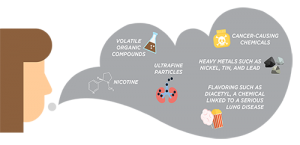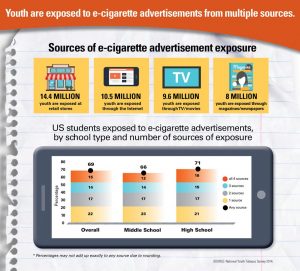It’s time for JUUL to face stronger regulations

A Juul e-cigarette resembles a long USB flash drive. It can be “recharged” with pods.
December 13, 2018
A young adult may appreciate the buzz and relaxation following the rip of a Juul. A concerned parent may fear for their child’s health upon reading the atrocious rumors regarding the company. A cigarette smoker might find themself dumbfounded in choosing the right path to quit. What they all have in common, is that the long term effects of the product are unknown.
“We believe that vaping can have a positive impact when used by smokers, and can have a negative impact when used by nonsmokers,” reads a statement on JUUL’s official website, “Our goal is to maximize the positive and reduce the negative.”
As the greatly successful company, JUUL, promises that its intentions are nothing but good, a number of medical professionals are beginning to sound the alarm, saying that the long term effects of JUULs on teenagers could be extremely harmful.
Publicly, JUUL argues that it was never intended for use by minors. The company says that its aim was to help cigarette smokers shift away from tobacco by using the much safer version of the vaping device. Critics however, say that JUUL may have intentionally marketed to teenagers to increase profits. Looking at advertising, it features models who appear to be very young and appeal to a younger audience. Some argue too that the vape itself has a modern look to it, almost like a flashdrive, which might also attract a younger and more tech-savvy teenage customer base. Finally, the product itself appeals to the tastes of a younger audience with flavors like mango, fruit medley, and cucumber. Whether intentionally or inadvertently, the use of JUULs have become considerably cool amongst young adults.
Medical experts are concerned. Recent studies indicate that JUUL delivers higher concentrations of nicotine than other e-cigarettes. Not only is nicotine highly addictive, but it is additionally extremely toxic to fetuses and is known to impair brain and lung development if used during adolescence. The amount of nicotine in one JUUL pod has shown to be equivalent to one pack of cigarettes. As studies show that teens sometimes use multiple pods in one sitting, they are able to unknowingly become exposed to dangerous levels of nicotine that can have immediate and long-term health consequences.
The ever-growing usage among teenagers has now reached near-epidemic proportions. It is time for the government to pass the same restrictive measures on JUUL and e-cigarettes as they have done with traditional tobacco products, such as where it can be sold, how the product is advertised, etc. It’s only with these aggressive preventative measures that we may be able to stem the tide of addiction, and the potential long term health effects that face the youth of America.
Cited Sources
“E-Cigarettes around 95% Less Harmful than Tobacco Estimates Landmark Review.” GOV.UK, GOV.UK, www.gov.uk/government/news/e-cigarettes-around-95-less-harmful-than-tobacco-estimates-landmark-review.
“The Smoking Alternative, Unlike Any E-Cigarette or Vape | JUUL.” JUUL | The Smoking Alternative, Unlike Any E-Cigarette or Vape, www.juul.com/.
“The Dangers of Juuling.” National Center for Health Research, 13 Aug. 2018, www.center4research.org/the-dangers-of-juuling/.
Hoffman, Jan. “The Price of Cool: A Teenager, a Juul and Nicotine Addiction.” The New York Times, The New York Times, 16 Nov. 2018, www.nytimes.com/2018/11/16/health/vaping-juul-teens-addiction-nicotine.html.



